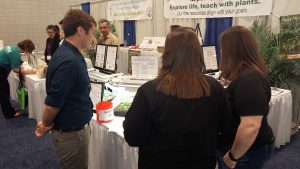ASPB exhibits at major science education conferences each year. One of our newest outreach volunteers, Sterling Field, M.S. University of Tennessee, shares a few experiences with ASPB at the 2016 National Science Teachers Association annual meeting.
 I really enjoyed volunteering with ASPB at the NSTA conference. I got to talk with teachers about bringing plant-based experiments to their classrooms. I have some experience with teaching plant biology, but volunteering with ASPB was an especially rewarding experience because it helped me know about resources available to better teach plant biology concepts. Two particular interactions I had while volunteering stick out as being especially rewarding:
I really enjoyed volunteering with ASPB at the NSTA conference. I got to talk with teachers about bringing plant-based experiments to their classrooms. I have some experience with teaching plant biology, but volunteering with ASPB was an especially rewarding experience because it helped me know about resources available to better teach plant biology concepts. Two particular interactions I had while volunteering stick out as being especially rewarding:
- One encounter was helping a middle school teacher get involved with The GMO Corn Experiment. This experiment was to see if wild animals have a preference for or against GMO corn. We shared a kit from Biology Fortified with two ears of corn, one was GMO and the other was not, both were unmarked but their identity could be looked up once the experiment was completed and they could up

Sterling Field (L) discusses FPsc with 2 educators load their results online. The teacher was very enthusiastic because the experiment was real science. After the experiment the class will upload their data to become part of a large preference study. This also fostered discussion on current ‘hot’ topics in biology and society.
- Another great experience was interacting with a high school teacher who was interested in using Brassica rapa plants to teach genetics via the Fast Plants – self-compatible program. The B. rapa seeds were provided by Scott Woody, and were great for teaching genetics to non-plant biologists because the two phenotypes were obviously different. This meant that students without plant biology experience could identify the two lines easily. This resource is combined with an easy to understand board game-like worksheet to help teach students about inheritance. The teachers were very interested and excited to be able to bring more experiments into their class rooms to help teach genetics by breaking it down to easy to understand concepts, and I was very happy to be able to get more people interested in using plants for teaching!
Meeting other plant biologists who were passionate for educating others about plants was another engaging part of volunteering with ASPB at NSTA.
